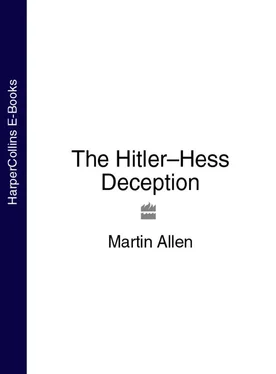On 12 October 1939, Neville Chamberlain finally responded to Hitler’s offer, terming his proposals ‘Vague and uncertain’, and making the comment that ‘they contain no suggestions for righting the wrongs done to Czechoslovakia and Poland’. No reliance, Chamberlain asserted, could be put on the promises of ‘the present German government’. After the humiliating defeats of Munich and Hitler’s move against Poland, Britain’s Prime Minister now suddenly exhibited a strength few thought him capable of. If Germany wanted peace, ‘acts – not words alone – must be forthcoming’, and he called for ‘convincing proof’ from Hitler that he really wanted an end to the conflict.
The following day, 13 October, Hitler responded by issuing a statement which declared that Chamberlain, in turning down his earnest proposals for peace, had deliberately chosen war. Such was the public face of the events at the time.
Yet what about the private face? What about the travels of Mr Dahlerus, which few people in Britain, including the House of Commons, ever got to hear about?
It was one thing for Chamberlain to turn down some airy peace proposal made by Hitler, presumably aimed at home consumption. In the world of diplomacy, much more credence would have been given to such a proposal if it had been made in writing, or delivered by an official emissary. It is not suggested that peace would have suddenly erupted on the receipt of an official communiqué more clearly outlining Germany’s peace proposal – but it would certainly have been a starting point, from which an accord approaching the Allied demands could have been discussed, even if those negotiations subsequently failed.
Incredibly, such a communiqué is exactly what the British government, in the form of Neville Chamberlain and Foreign Secretary Lord Halifax, had secretly received as far back as August 1939.
In the spring of 1941, Hjalmar Schacht, the head of Germany’s Reichsbank, approached the then non-combatant American government to ask if they would be prepared to act as intermediaries to help negotiate a peace between Germany and Britain. Soon a positive flurry of urgent memos were flying between Foreign Office mandarins in Whitehall querying what should be done, for they were not at all keen for America to interfere in Britain’s foreign policy decisions. Eventually the Permanent Under-Secretary at the Foreign Office, Sir Alexander Cadogan, sent a ‘most secret’ memorandum to Lord Halifax, who was by then British Ambassador in Washington, that stated:
Many thanks for your letter of 17th June about Schacht’s peace feeler.
We recently prepared for our own use a memorandum summarising the various peace feelers which have reached us since the beginning of the war. The Germans are obviously now attempting to interest certain circles in the USA in the possibility of an early peace … It therefore occurred to us that you might like to see a copy of this memorandum and to communicate it very confidentially to the President for his own personal and secret information. In suggesting that you should do this we do not mean to suggest for a moment that the President is in any need of advice as to how to handle any such German approaches, but he may find details of our own experiences useful in helping him to handle the ‘weaker brethren’ in the USA … 14
The memorandum then went on to disclose details of sixteen peace attempts that had been made by the Germans since the outbreak of war. These included the Dahlerus peace initiative, about which it was revealed: ‘[Dahlerus] was convinced that Göring genuinely regretted the outbreak of the war and short of actual disloyalty to Hitler would like to see a truce negotiated. The unwillingness of the Polish government to treat in earnest about Danzig and The Corridor, coupled, perhaps, with deliberate malice on the part of Ribbentrop, had unleashed the conflict.’ 15The memorandum went on to explain that on 18 September 1939 a confidential meeting had taken place in London between high-ranking officials of the Foreign Office, including Cadogan, and Dahlerus, who ‘reported that the German army were now approaching a position in Poland beyond which they would not go and that the German government were seeking an early opportunity to make an offer of peace.’ 16
At this meeting Dahlerus was informed that the British Foreign Secretary Lord Halifax ‘could conceive of no peace offer likely to come from the German government that could even be considered … and that the British government could not … define their attitude to an offer of which they did not know the nature’.
On 12 October 1939, the report went on, Dahlerus had transmitted the final details of Germany’s very comprehensive peace offer. These included the information that Hitler was prepared to discuss the Polish situation, non-aggression pacts, disarmament, colonies, economic questions and frontiers. Indeed, Dahlerus even communicated that ‘Hitler had taxed the patience of the German people over the Soviet Union, Czechoslovakia and Poland, and that if Göring, as the chief negotiator, secured peace, Hitler could not risk acting counter to these national undertakings.’ 17
This comprehensive peace initiative was kept secret in both Germany and Britain. However, even while admitting these details for ‘President Roosevelt’s Eyes Only’ in 1941, the British government was still sensitive enough about the subject to conceal certain details about what had taken place. To the uninitiated, Dahlerus’s efforts at peace in 1939 appeared a damp squib that had fizzled out. Yet there had been much more to them than the British government was prepared to admit to the American President.
During 1938, Neville Chamberlain had, with much effort, negotiated comprehensive deals with Hitler. Hitler, however, had shown a dangerous penchant for negotiating agreements and then reneging on them as soon as it suited his purposes. He wasn’t, as one diplomat later remarked, a gentleman. Chamberlain had therefore, not unnaturally, developed a marked sensitivity about being seen to negotiate again with the Nazis, whilst at the same time exhorting the British people to prepare themselves to make great sacrifices. Thus the report to Roosevelt, at a time when America was still neutral and Britain could not afford even to hint at the possibility of negotiating with the Nazis, for fear of losing American support, concealed the fact that Dahlerus had been involved in Hitler’s attempts to prevent war before the conflict had started. As consummate politician and diarist, close friend of Britain’s high and mighty, Sir Henry ‘Chips’ Channon commented two days before Germany’s invasion of Poland, on 28 August 1939: ‘Mr D[ahlerus] and a Mr Spencer have it appears been negotiating secretly here … I doubt the validity of the Walrus’s [Dahlerus’s] credentials, but he is taken seriously by Halifax, and a secret plane transported the two emissaries here, with special facilities at the airport.’ 18
Exactly one month later, on 28 September, Channon recorded that Dahlerus, having been to Berlin to consult with Hitler, was back in London for another secret meeting – a meeting that would not be mentioned in the information released to Roosevelt: ‘Very Secret. “The Walrus” is in London. He arrived today by plane and this time his visit is known to Hitler. Halifax and others are seeing him this afternoon. No-one knows of this. What nefarious message does he bring?’
The following day, Channon noted:
The fabulously mysterious ‘Walrus’ … was interviewed secretly yesterday … This morning he walked about the Foreign Office openly. Also Cadogan had a talk with him and a report of their conversation was given to Lord Halifax, who read it I believe, at the War Cabinet … The French, always realistic, say ‘we had better make peace as we can never restore Poland to its old frontiers, and how indeed should we ever dislodge the Russians from Poland even if we succeeded in ousting the Germans?’ 19
Читать дальше












